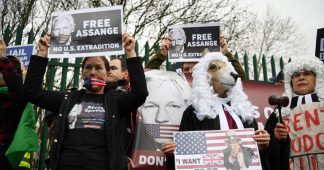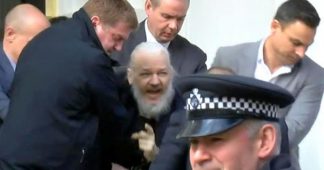By Kevin Gosztola
06 Jan 2021
A British district judge denied bail for WikiLeaks founder Julian Assange after a hearing in which the prosecution argued he had helped NSA whistleblower Edward Snowden “flee justice” and would abscond if released from the Belmarsh high-security prison.
“As far as Mr. Assange is concerned, this case has not been won,” Judge Vanessa Baraitser declared. She said the United States government “must be allowed to challenge [her] decision.”
Baraitser referred to the lengthy history of the case and how he “jumped bail” and entered the Ecuador Embassy to obtain asylum in 2012.
She went on to highlight the “huge support networks” he still has “should he again choose to go to ground,” and Baraitser agreed with the prosecution that WikiLeaks’ assistance of Snowden made Assange a flight risk.
Assange has been confined at Belmarsh since he was arrested and expelled from the Ecuador embassy in April 2019. All along, Judge Vanessa Baraitser agreed with prosecutors that he was a flight risk.
“Mr. Assange’s past conduct shows the lengths he is prepared to go to avoid extradition proceedings. If I released him today, he would not return to face these extradition proceedings,” Baraitser declared during a hearing in March 2020, when the COVID-19 pandemic was initially intensifying worldwide.
In her ruling on bail, despite evidence of a recent outbreak at Belmarsh, the judge maintained that the facility was properly caring for prisoners and Assange would be safe.
Edward Fitzgerald, an attorney for Assange, argued the extradition decision changed any motive Assange would have to flee London before the case was resolved. In fact, the extradition decision came with an order of discharge for Assange.
“The logical outcome of the ruling would be he regains liberty at least conditionally,” Fitzgerald stated.
Fitzgerald questioned whether the Justice Department is even serious about an appeal, given recent reporting on the incoming administration of President-elect Joe Biden.
Although Fitzgerald indicated Assange would be willing to wear a GPS tracking device while under house arrest, the judge gave no reasoning why this would not be enough to prevent him from absconding before the date of his appeal.
Assange has not seen his family in person since March 2020, and Belmarsh has suspended social visits. It is widely recognized that physical contact would alleviate the mental distress that factored into the judge’s decision against extradition.
London is on lockdown as a mutated variant of COVID-19 rips through the city, and the date for the appeal proceedings is unknown.
And here’s my full video report that was broadcast immediately after proceedings concluded:
Published at shadowproof.com










